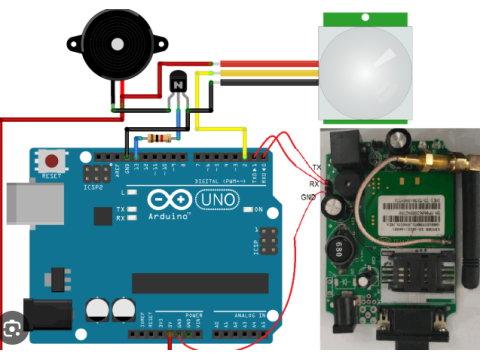GSM-Enabled Fire and Security Detectors
The integration of a GSM module with fire and security detectors is a practical and innovative solution. This combination offers several advantages:
- Cost-Effectiveness: Reduces the need for separate devices.
- Ease of Installation: Simple setup process for users.
- Remote Monitoring: Enables real-time status updates via SMS or voice alerts.
This technology has become a popular choice in the safety systems market, with models tailored for both fire and security applications.
Features of GSM Detectors
GSM-enabled detectors typically include:
- Autonomous power supply with battery life ranging from 6 months to 2 years.
- Built-in sound alerts (sirens).
- Remote control via key fobs or SMS commands.
While these features make them convenient, it’s essential to check for detailed user manuals before purchasing to ensure ease of setup and operation.
GSM Fire Detectors
A well-known example is the IP 212-63A-GSM smoke detector. Key features:
- Coverage area of up to 915 sq. ft. (85 m²) with installation heights up to 11.5 ft. (3.5 m).
- Supports up to 10 additional slave detectors, creating a synchronized alarm system.
- Includes a built-in siren for immediate audio alerts.
Cost Analysis:
- A single unit costs approximately $50, with additional detectors around $15 each.
- For a small home (5-6 detectors), the total cost is roughly $100-150.
For larger properties, however, installing a dedicated fire alarm system with GSM capabilities and standard smoke detectors may be more cost-effective.
GSM Security Detectors
Security GSM detectors operate similarly to their fire counterparts, with built-in GSM modules for remote notifications. Examples include:
- Express GSM
- Rexant Guard
Prices range from $40 to $70, with variations in features such as built-in sirens or external sounders.
Limitations:
- Detection range of approximately 33 ft. (10 m), making them suitable for single-room coverage.
- The need for multiple units for comprehensive property coverage significantly increases costs.
For smaller spaces or off-grid applications, these detectors are a viable solution. However, for most users, a traditional GSM-based security system with multiple sensors offers greater flexibility and scalability.
Are GSM Detectors Worth It?
While GSM-enabled detectors have some advantages, their practicality depends on specific use cases:
- Pros: Standalone operation without external power, simple installation.
- Cons: Limited coverage, higher costs for larger spaces, and potential vulnerabilities if integrated sirens alert intruders.
For reliable and scalable safety solutions, a traditional GSM alarm system remains a more robust and cost-effective option.
Visit safsale.com for expert advice on security systems and GSM-enabled safety solutions tailored to your needs!

